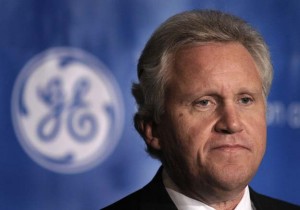
GE CEO Jeffrey Immelt aims to kick-start the electric vehicle market with a purchase that could be measures in the "tens of thousands."
General Electric, the industrial giant that provides the equipment generating a third of the world’s electric power now wants to charge up the electric vehicle market.
GE CEO Jeffrey Immelt’s plan to buy “tens of thousands” of battery cars could very well kick-start the nascent market, according to industry observers, and will certainly be the largest order for battery vehicles in history.
The move isn’t entirely altruistic. As the world’s leading provider of electric generation equipment, and as a major force in the expanding market for wind, solar and other “green” energy technologies, a GE a spokesman said the company is betting that for every dollar spent on electric vehicles it will get a dime in revenues of its own.
Speaking at a conference in London, Immelt said that half of GE’s huge sales force, a total of 45,000 men and women, will be assigned electric vehicles, though the executive declined to put a specific figure on the company’s planned battery car purchase – nor did he say whom GE would turn to for the vehicles.
The Fortune 100 company won’t be the only publicly-traded company investing in battery car technology. A number of major utilities have plans to build electric vehicle fleets, as do firms ranging from Hollywood Studios to delivery services, many of whom drive relatively short distances in urban service and see battery cars as a way to curb rising fuel costs. But industry watchers say they know of no company planning anywhere near the apparent size of the GE proposal.
GE has been steadily expanding its presence, meanwhile, in green technologies, including solar and wind generators, as well as the smart-grid technology seen as critical to adequately handling the demand of a national fleet of battery cars.
GE has also formed a partnership with the battery maker A123 Systems, Inc., which is producing lithium-ion batteries for cars and trucks, as well as sodium-based batteries that can be used in locomotives. GE is the largest shareholder in the Massachusetts-based A123.
In his speech, Immelt noted that in the current economic climate, with fuel prices down, investments in clean technologies has slipped.
But, he argued, industry should be investing more, asserting that, “Now is exactly the time, because it’s less popular, where we have to invest more. We have to do it more courageously and we’re going to have to go forward for awhile without government at our backs.”
